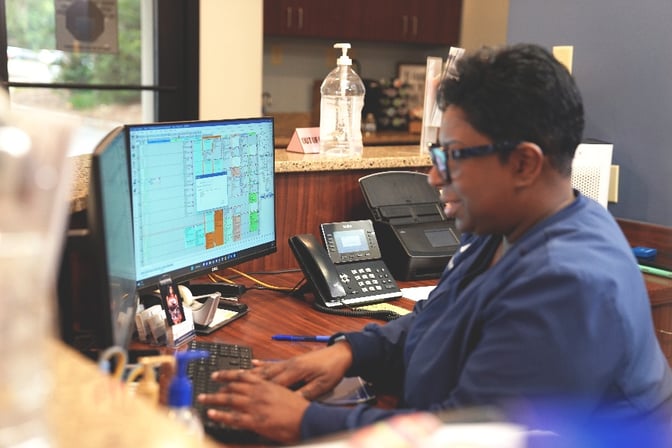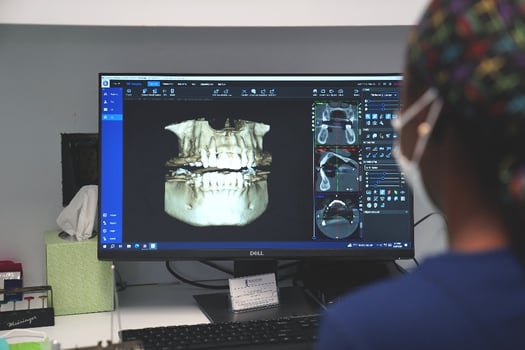The future of the dental industry: Trusted consultants share insights


The dental industry is facing new changes and challenges every year. Sometimes it’s hard to know what’s just a passing phase versus what’s going to stick, especially when it comes to the economy, technology, and the general state of the dental industry.
At DCS, we’re committed to staying in the know when it comes to the dental industry. Although we aren’t dentists ourselves, we serve dentists, and we want to see their businesses thrive.
We chatted with two top dental consultants to get their two cents on what’s going on in the dental industry.
Introducing: Kara Kelly of Clinical HR and Vincent Crump of Midline Dental Partners. These industry experts answered 4 burning questions we had about the dental industry, and we’re sharing their answers with you.
We asked Kara and Vincent the following questions:
- What is the #1 challenge private practice owners are facing in 2023?
- What new technology has been a game-changer in 2023?
- What is one big goal many private practice owners share in 2023?
- If a private practice owner could wave a magic wand and change something in their practice overnight, what would they change?
It’s crucial to understand where the dental industry is going, so you can keep up, adapt, and profit as a dental practice.
1. What is the #1 challenge private practice owners are facing in 2023?
When we understand the challenges all private practice owners are facing, we can develop effective solutions.
Kara sees extended struggle in the Human Resources (HR) arena, “Private practice owners in 2023 are still facing the same challenge they did in 2022: finding, retaining, and motivating engaged and productive team members. In many areas, the market is still extremely competitive.”
This is the case across many industries, not just dental. But because the dental industry (especially the administrative side) is so specialized, it’s even more difficult to find the right people.
Kara continues, “The demand for higher wages and better benefits has continued to increase, though not as dramatically as in previous years. Many practices have turned to job candidates with far less dental experience that require more training than in prior years. Managing and mitigating the talent gap (while avoiding burnout for their existing team) is currently a top priority.”

The other consultant we spoke to, Vincent Crump, agrees, “One of the biggest challenges I see private practice owners facing is the ability to hire, onboard, train, and retain staff. It is a constant battle to maintain adequate staffing levels.”
Luckily for us, Vincent also offers his expert recommendation:
“I have more heavily than ever recommended outsourcing wherever possible. The first and most logical area to do this is your insurance and revenue cycle management systems.”
Takeaway #1:
The staffing shortage is an ongoing problem in the dental industry.
It’s no surprise that more and more dental practice owners are relying on outsourced services for their workflows, instead of spending time and money on recruiting and training the right team members.
By sharing the workload with external partners, the likelihood of your internal staff burning out lessens dramatically. Not to mention, your team’s processes are optimized by professionals who also offer access to expert knowledge you wouldn’t have otherwise.
2. What new technology has been a game-changer in 2023?
No matter which industry you’re in, technology is constantly evolving. Anything that will make your processes more efficient is usually positive. But what recent technology has made such a huge impact that it’s changed the game?
Kara and Vincent have encouraging views on this topic.
Kara begins, “The rapid emergence of new AI technologies has been a game-changer for private practices — for both clinical and administrative roles. New technologies that assist with dental imaging and voice charting can help reduce the time spent on these tasks while improving accuracy, better supporting clinical team members.”
Some people look at developing technology and fear that it will take over their tasks, and take away their jobs.
But these consultants don’t think so. In fact, they think the new AI technologies will make jobs better.
Vincent chimes in, “The further introduction of artificial intelligence into the dental field is going miles. Using software such as ChatGPT to build standard operating systems has been monumental for time efficiency. The expansion of AI to read radiographs more effectively has been quite influential as well.”
The current staffing shortage means dental teams need more support than ever. Vincent and Kara both believe developing technology can support multiple facets of your dental business systems.
“Content creation software can support administrative teams with everything from drafting procedures and patient letters to digital workflows to more effectively utilizing video for social media marketing. These technologies allow team members to work smarter, not harder, which equates to more significant ROI for the practice investment per team member. It's an exciting time in dentistry!” Kara exclaims.
Related: A digital dental practice: 3 reasons why you should embrace technology at the office
Takeaway #2:
Artificial intelligence continues to penetrate the dental industry. But it’s best used to support and accelerate the talents and skills of your team, not to replace them.
Your team doesn’t need to fear that AI will take away their jobs. Instead, they should use it to their advantage — and yours — to increase efficiency and accuracy.
It’s important that dental practice owners encourage their teams to learn how to work with AI and assistive technologies, not against them.
3. What is one big goal many private practice owners share in 2023?
When you know the goals of other top practices, you can make better sense of what your own goals should be.
Vincent looks at it from a logistical perspective: “Overhead control is a primary focus for all my clients. With rising wages, supply costs, and physical operating expenses directly affecting the cashflow of the office, there has never been a more pertinent time to implement budgetary systems.”
Kara’s answer is similar, but she dives into how maintaining overhead control can affect the team as well.
“Considering the upward trend of corporate dentistry, a shared goal among private practice owners is to still be in business 10 years from now. To not just survive, but to thrive. This vision will look different to each individual practice owner.”

Kara continues,“But most [owners] have a goal of sustainably growing their practice, retaining talented team members, expanding their patient base, increasing revenue through high-value services, and building their practice into a true asset.”
It boils down to:
- Practice growth
- Increased revenue
- A happy and healthy dental team
But achieving these goals doesn’t come without complications.
Kara throws her HR hat on again: “From an HR perspective, the goal of growth typically creates HR challenges. More people, more problems. However, a practice owner with a growth mindset will understand the critical importance of building a scalable structure.”
Kara continues to explain how a solid HR foundation allows dentists to add team members, or even additional office locations.
A healthy dental office also recognizes and understands the importance of:
- Policies that will help them maintain consistent standards which mutually benefit the practice
- Training and education
- Team culture
- Onboarding
And, of course:
- Its patients
Takeaway #3:
Though there are factors out of their control, it sounds like most dental practice owners wish to maintain their business, not sell or partner with DSOs. Private dental practice owners want autonomy for their businesses 10 years from now and beyond.
These owners are seeking new systems and strategies to deal with rising costs and the staffing shortage—they’re not ready to give up. They have the drive and the mindset for growth, they only need reliable support and adequate resources to help them reach their goals.
4. If a private practice owner could wave a magic wand and change something in their practice overnight, what would they change?
What are dental practice owners wishing for? Knowing this will give you perspective on what you could have at your own practice.
Kara approaches this question from two angles: A preferred provider organization (PPO) practice versus an out-of-network or fee-for-service (FFS) practice.
“If a PPO practice owner dependent upon insurance reimbursement could wave a magic wand, they would wish for an increase in PPO reimbursements to offset the significant increase in supply costs and wages over the past few years.”
She continues, “When the hourly rate for a hygienist is 20% or higher than what the insurance company will pay for a prophy [dental prophylaxis], disregarding other operational overhead expenses associated with this service, it's not sustainable.”
But an out-of-network or FFS practice has different wishes.
Kara explains, “An out-of-network or fee-for-service practice owner with more control over their fee schedules, however, might wish for things money can't buy. A magical solution to a healthy, cohesive practice culture, for example. Your fees, your top-line revenue, your profitability, your average new patients per month, the number of ops in your office—none of that matters if your culture is toxic, and you can't keep team members.”

Vincent says revenue is king: “Without a question, insurance reimbursement would be the magic change. Although it is possible to negotiate and restructure the practice’s participation, it is a tedious and lengthy process. There are many ways to structure your PPO relationships, but most private practice owners have no idea where to start.”
He continues to encourage turning to experts and vendors to support dental teams: “To further the point of outsourcing, having a trusted credentialing company to oversee this process is well worth the money. A $10,000 investment can mean $100,000s in long-term reimbursement gain.”
Revenue and control of your fees aside, there is also the personal part of running a private practice — you just want everything and everyone to work smoothly.
Kara adds, “A fully staffed, highly skilled, and harmonious team can immeasurably reduce the stress of private practice ownership, regardless of the practice's business model. If it could be accomplished with the wave of a magic wand, you can bet practice owners would be lining up to buy one.”
Related: 5 smart ways RCM builds your dental practice success
Takeaway #4:
In-network dentists want faster reimbursement from insurance providers, while out-of-network dentists are zeroed-in on cultivating a healthy, seamless dental office with a happy dental team.
Both of these goals require knowledgeable and experienced support from dental industry experts. As Vincent mentioned, even top consultants are recommending outsourcing parts of your dental practice to resourceful professionals who will oversee processes and pave the way for practice growth.
Use RCM to capitalize on these dental industry insights
To recap, Kara Kelly and Vincent Crump answered the following questions:
- What is the #1 challenge private practice owners are facing in 2023?
- What new technology has been a game-changer in 2023?
- What is one big goal many private practice owners share in 2023?
- If a private practice owner could wave a magic wand and change something in their practice overnight, what would they change?
From their answers, we’ve gleaned that the staffing shortage is still widespread. In fact, staffing concerns were a part of both consultants’ answers to all of our questions, suggesting that it impacts — and is impacted by — multiple facets of your dental business.
Artificial intelligence and assistive technologies can help dental offices run more smoothly by supporting everyday business operations. AI-powered services also address the need for faster reimbursement — which is at an all-time high for private dental practices who need to train inexperienced staff and want to retain their independence in the decades ahead.
Today’s dental practice owners require solutions for their staffing and revenue concerns, and DCS offers end-to-end revenue cycle management that lightens your team’s workload while maximizing your cashflow.
Our experts will partner with your team to streamline your processes and collect more from patients and insurance companies. This empowers your staff to focus on running your office onsite, and more importantly, providing excellent patient care.
Capitalize on these dental industry insights by using our RCM services to collect more and worry less. Book a call with one of our experts at DCS.
Related Posts
Dental revenue resources from Dental Claim Support

